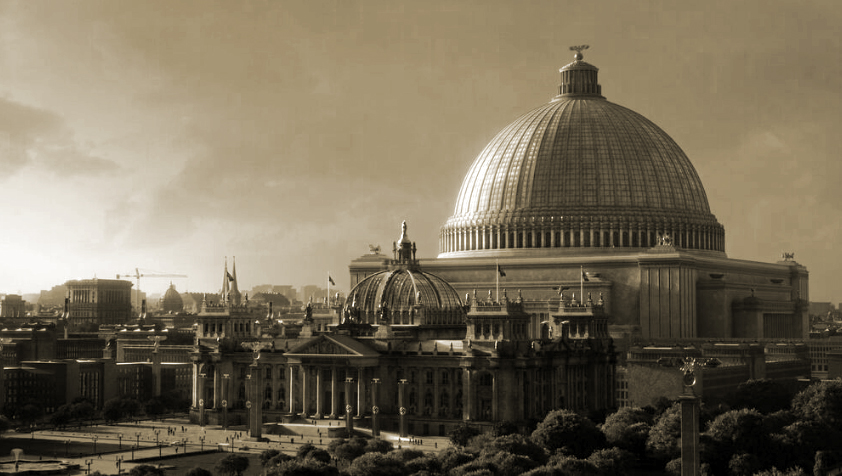 In short, it is the ‘species’ (in other passages it is the ‘race’), that is to say, the most permanent, impersonal and essential aspect of the ‘people’ itself, that counts for the leader of the Third German Reich.
In short, it is the ‘species’ (in other passages it is the ‘race’), that is to say, the most permanent, impersonal and essential aspect of the ‘people’ itself, that counts for the leader of the Third German Reich.
The people—his beloved German people—were to expand to the East, to colonise with the plough the immense spaces conquered by the war, build there a culture he wanted to be unprecedented; and this, not because they were ‘his’ people, but because they represented, in his mind, the nursery par excellence of a collective superhumanity; because, considered objectively, they were distinguished by qualities of health, of physical beauty, of a character of conscience, of hard work, of honesty, courage and loyalty; of intelligence both practical and speculative and of aesthetic sense: qualities which made them the ideal type of ‘the species’: the historical human closest to the ‘Idea of Man’ in the Platonic sense of the word.
______ 卐 ______
Editor’s Note: But apparently, according to this recent comment, those Germans are already gone. See my forthcoming entry on this subject right after I post the present one. Savitri continues:
______ 卐 ______
Because the Führer felt that he could, and indeed in our time was the only one who could have done it, he laid the foundations of a ‘Great Reich’ which would have been much more than a political entity. In the centuries that would have followed a National Socialist German victory, it was to gradually found a new, healthy and beautiful civilisation faithful to the fundamental laws of life (in contrast to modern society which denies them, or at least tries to thwart them): a peculiar civilisation within the Dark Ages into which we are plunged but centred, unlike that of Europe today, on the ceaseless struggle against the Forces of disintegration; against all softening and all uglification, against ‘the direction of history’ which is only decadence.
And it was to be up to this grandiose task that he had to practise the politics of the overflowing life; encourage the birth rate, certainly, but also not oppose natural selection; eliminate without hesitation the crazy, the weak, the mongrels and to ensure the survival of the best.
The elite of the best, the natural aristocracy, necessarily constituting a minority (and this, more and more as the Dark Ages progressed), was necessary to exalt the large family, to honour spectacularly the most fertile mothers, to do everything for the healthy, good-bred child, so that this minority would still be large enough to provide the framework for an indefinitely conquering organisation, as well as the creative core: the giants of art and thought of a superior culture.
The Führer repeatedly emphasised his plan to incorporate the Nordic elites—Scandinavian, Dutch, Danish, etc. into the Great Reich which he wanted to build, and sought the collaboration of Aryans (not necessarily ‘Nordics’) throughout the world. This alone would show how his racist philosophy and war aims transcended Germany, while retaining their roots there. And he would, if he had had the power to do so—that is, if he had won the war—have extended to all the Aryan elite of the earth his policy of encouraging fertility.
Two facts prove abundantly that for him these were quite different from projects ‘in the direction of Time’. The number of births was planned only because, without it, quality—already scarce, today, even among the superior races—risked becoming even scarcer: children destined to become men of exceptional value are not necessarily among the two or three first-born of their family.[1] We know what the race loses when an adult, or even a promising youth, dies. We don’t ‘know what we may be depriving the race of every time we prevent a child from being conceived, or remove it before it is born’.
On the other hand, the natural equilibrium between man and his environment was to be ensured not by any limitation of births (or pregnancies), but by the abolition of any intervention tending to encourage the survival of the weak or the ill-constituted by the quasi-permanent state of war on the ever-expanding frontiers of the Great Aryan Reich, and by the attraction which any activity that was both useful or simply beautiful and dangerous would have exercised on the young.
The Aryan world, dominated to some extent by regenerated Germany, was to be a world of the Strong; a world where, at least, their scale of values was to express the collective ethics. There, one had to cultivate a love of life and hard and beautiful action, contempt for human suffering and death; banish from it the preoccupation with ‘happiness’, the search for consoling illusions, the fear of the unknown and all kinds of weaknesses, pettinesses, futilities inseparable from decadent civilizations. It was to be a milieu capable of engendering and promoting a more-than-human aristocracy: the complete antithesis of the stultifying reign of anthropocentric materialism, either of the Communists or the ‘consumer societies’.
_________
[1] Libres propos sur la guerre et la paix, translation by R. d’Harcourt, p. 74.